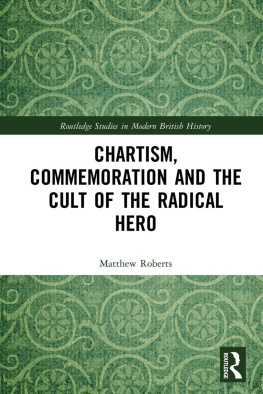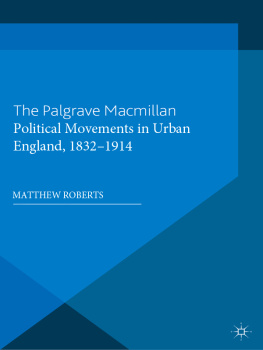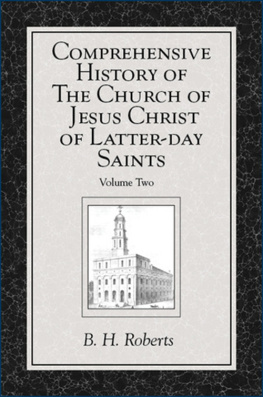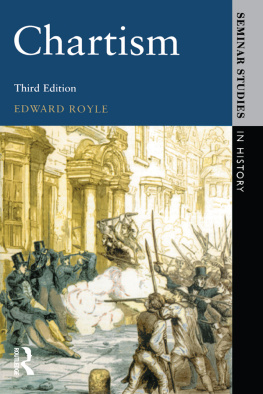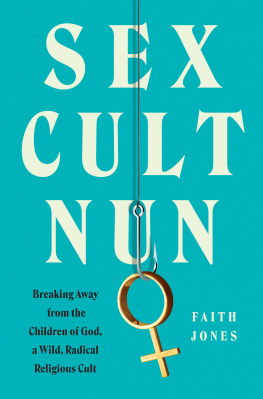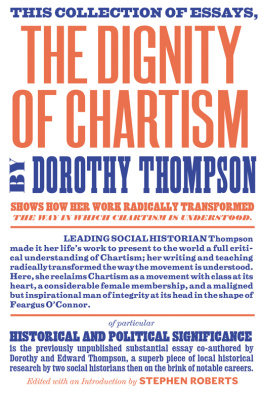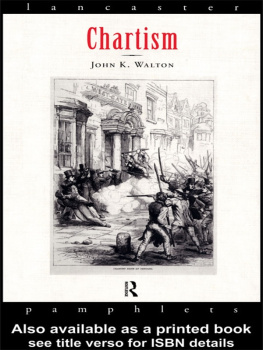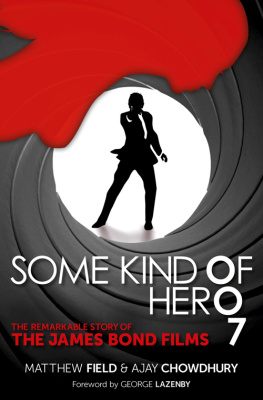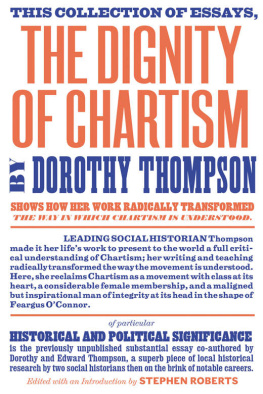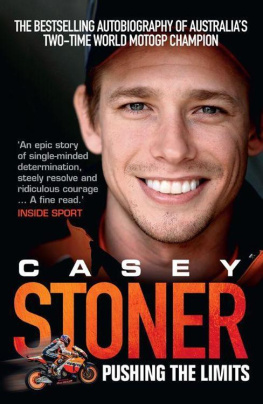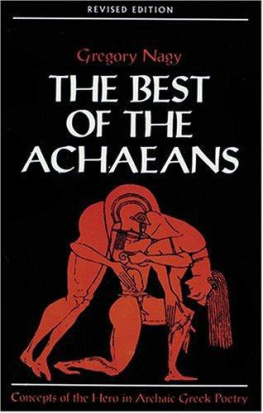Chartism, Commemoration and the Cult of the Radical Hero
Chartism, the British mass movement for democratic and social rights in the 1830s and 1840s, was profoundly shaped by the radical tradition from which it emerged. Yet, little attention has been paid to how Chartists saw themselves in relation to this diverse radical tradition or to the ways in which they invented their own tradition. Paine, Cobbett and other founding fathers, dead and alive, were used and in some cases abused by Chartists in their own attempts to invent a radical tradition. By drawing on new and exciting work in the fields of visual and material culture; cultures of heroism, memory and commemoration; critical heritage studies; and the history of political thought, this book explores the complex cultural work that radical heroes were made to perform.
Matthew Roberts is Reader in Modern British History at Sheffield Hallam University, Sheffield, UK.
Routledge Studies in Modern British History
Deprivation, State Interventions and Urban Communities in Britain, 196879
Peter Shapely
Private Secretaries to the Prime Minister
Foreign Affairs from Churchill to Thatcher
Edited by Andrew Holt and Warren Dockter
Liberal Reform and Industrial Relations
J.H. Whitley (18661935), Halifax Radical and Speaker of the House of Commons
Edited by John A. Hargreaves, Keith Laybourn and Richard Toye
Neoliberal Thought and Thatcherism
A Transition from Here to There?
Robert Ledger
English Gentlemen and World Soccer
Corinthians, Amateurism and the Global Game
Chris Bolsmann and Dilwyn Porter
Milton Keynes in British Culture
Imagining England
Lauren Pik
Winston Churchill
At War and Thinking of War before 1939
Edited by B.J.C. McKercher and Antoine Capet
James Mills Utilitarian Logic and Politics
Antis Loizides
Chartism, Commemoration and the Cult of the Radical Hero
Matthew Roberts
https://www.routledge.com/history/series/RSMBH
Chartism, Commemoration and the Cult of the Radical Hero
Matthew Roberts
First published 2020
by Routledge
2 Park Square, Milton Park, Abingdon, Oxon OX14 4RN
and by Routledge
52 Vanderbilt Avenue, New York, NY 10017
Routledge is an imprint of the Taylor & Francis Group, an informa business
2020 Matthew Roberts
The right of Matthew Roberts to be identified as author of this work has been asserted by him in accordance with sections 77 and 78 of the Copyright, Designs and Patents Act 1988.
All rights reserved. No part of this book may be reprinted or reproduced or utilised in any form or by any electronic, mechanical, or other means, now known or hereafter invented, including photocopying and recording, or in any information storage or retrieval system, without permission in writing from the publishers.
Trademark notice : Product or corporate names may be trademarks or registered trademarks, and are used only for identification and explanation without intent to infringe.
British Library Cataloguing-in-Publication Data
A catalogue record for this book is available from the British Library
Library of Congress Cataloging-in-Publication Data
Names: Roberts, Matthew, 1978- author.
Title: Chartism, commemoration and the cult of the radical hero / Matthew Roberts.
Description: Abingdon, Oxon; New York, NY: Routledge, 2020. | Includes bibliographical references and index.
Identifiers: LCCN 2019018231 (print) | LCCN 2019019566 (ebook) | ISBN 9780429584381 (adobe) | ISBN 9780429580260 (mobi) | ISBN 9780429582486 (epub) | ISBN 9780367187583 (hardback) | ISBN 9780429198106 (ebook)
Subjects: LCSH: ChartismHistory. | RadicalsGreat BritainHistory. | RadicalismHistory.
Classification: LCC HD8396 (ebook) | LCC HD8396 .R545 2020 (print) |
DDC 322.20941dc23
LC record available at https://lccn.loc.gov/2019018231
ISBN: 978-0-367-18758-3 (hbk)
ISBN: 978-0-429-19810-6 (ebk)
Typeset in Times
by Deanta Global Publishing Services, Chennai, India
Frontispiece: Chartist Print, by Thomas Paine Carlile. Courtesy of Peoples History Museum
Contents
BL | British Library |
BPU | Birmingham Political Union |
CSU | Complete Suffrage Union |
HO | Home Office Files |
LDA | London Democratic Association |
LWMA | London Working Mens Association |
NCA | National Charter Association |
NLI | National Library of Ireland |
NS | Northern Star |
TNA | The National Archives |
TS | Treasury Solicitors Papers |
During the course of researching and writing this book it has been my good fortune to have met several generations of Chartist scholars, mainly through Chartism Day, the annual conference which brings together academics and interested members of the public. The camaraderie, enthusiasm and sharing of ideas that I have encountered at these events have been without parallel. I have learnt much from, and enjoyed the company of, amongst others: Owen Ashton, Joan Allen, Richard Allen, Fabrice Bensimon, Malcolm Chase, Ian Haywood, Tim Keane, Les James, Janette Martin, Rohan McWilliam, Katrina Navickas, Denis Paz, Paul Pickering, Iori Prothero, Neil Pye, Stephen Roberts and Mike Sanders.
I would especially like to thank my humanities colleagues at Sheffield Hallam University who have been unfailingly supportive and patient. I have been most fortunate to be a member of a history subject group which has so many colleagues who work on different aspects of modern British history. Conversations in offices, in corridors, in pubs, over coffee, beer and occasionally wine, with Bruce Collins, Merv Lewis, John Singleton, Tony Taylor, and Nicola Verdon have been stimulating and often fun. Some colleagues Clare Midgley, John Singleton and Tony Taylor have gone above and beyond the congenial by generously reading and commenting on drafts of chapters, and to them I am most grateful. As a fellow historian of British popular radicalism, Tony deserves special thanks. His enthusiasm and deep knowledge, particularly of post-Chartist commemoration and republicanism, has been a source of inspiration over the years. I do hope he forgives the gentle sparring in .
Beyond Hallam and Chartist studies, I am indebted to the following people for answering various queries and passing on extremely helpful information: John Baxter, John Belchem, Alan Brooke, Nick Draper, Richard Gaunt, John Hargreaves, Jon Lawrence, Henry Miller, Robert Poole and Edward Royle. The last in particular, who first introduced me to the study of popular radicalism as an undergraduate at the University of York, has been a regular sounding board for my ideas and I have benefited from numerous email exchanges and conversations. Another York debt is owed to Geoff Cubitt who exposed me to the burgeoning fields of history and memory, and cultures of heroism. I would also like to thank Allen Warren who first impressed on me the importance of integrating the histories of England and Ireland. One of the most rewarding experiences I have encountered as an academic was being part of a collaborative project with Gordon Pentland and Mark Nixon on the material culture of Scottish radicalism. Gordon and Mark helped me to think through some of my early and hazy ideas in respect of Chartist visual and material culture. I would also like to thank Joan Allen, Malcolm Chase and Robert Poole for acting as referees for various grant applications. Malcolm, through his scholarship and generosity, has been a major influence in my metamorphosis from being a late-Victorian political historian to an historian of popular radicalism and protest in the first half of the nineteenth century. I owe a particular debt of gratitude to James Epstein and Miles Taylor for help at the final stages in shaping the material into a coherent monograph, though any remaining deficiencies are mine entirely. I also record my thanks to the Trustees of the Scouloudi Foundation, administered by the Institute of Historical Research, and for the generous financial support of my own institution through the Humanities Research Centre led by Chris Hopkins who has always been supportive in every sense of the term. Thanks also to Fiona Gannon for translating an article from the Welsh Chartist newspaper Udgorn Cymru into English.



